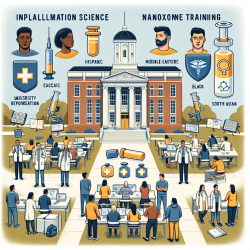Introduction
In recent years, the role of school meal programs in supporting the dietary needs of students, particularly those from food-insecure households, has gained significant attention. A pivotal study titled "Associations among Food Security, School Meal Participation, and Students’ Diet Quality in the First School Nutrition and Meal Cost Study" provides valuable insights into how these programs contribute to children's diet quality. This blog explores the study's findings and offers actionable strategies for practitioners to enhance their skills and improve outcomes for children.
Key Findings from the Study
The study utilized data from the School Nutrition and Meal Cost Study to assess the relationship between food security status, school meal participation, and students' diet quality. Key findings include:
- Food-insecure (FI) and marginally secure (MS) students were significantly more likely to participate in the National School Lunch Program (NSLP) and School Breakfast Program (SBP) compared to food-secure (FS) students.
- School meals contributed significantly more energy to FI and MS students' diets than to FS students, highlighting the importance of these programs in meeting energy needs.
- All groups' dietary intakes from school foods were of higher quality than non-school foods, indicating the positive impact of school meal programs on diet quality.
Implications for Practitioners
For practitioners in the field of speech-language pathology and related disciplines, these findings underscore the importance of advocating for and supporting school meal programs. Here are some strategies to consider:
- Encourage Participation: Work with schools to promote participation in NSLP and SBP, especially among FI and MS students. Highlight the nutritional benefits and the role of these programs in supporting academic and social outcomes.
- Collaborate with Schools: Partner with school nutrition professionals to develop strategies that make school meals more appealing and accessible to students. Consider initiatives like breakfast in the classroom or "second-chance breakfasts."
- Support Policy Initiatives: Advocate for policies that expand access to universal free meals and afterschool snacks or suppers, which have been associated with higher participation rates.
Encouraging Further Research
While the study provides valuable insights, there is always room for further research. Practitioners can contribute to the body of knowledge by:
- Conducting Local Studies: Collaborate with local schools to assess the impact of school meal programs on students' diet quality and academic performance in your community.
- Exploring Barriers to Participation: Investigate the factors that may prevent students from participating in school meal programs and develop targeted interventions to address these barriers.
Conclusion
School meal programs play a critical role in supporting the dietary needs of students, particularly those from food-insecure households. By leveraging the findings from the study and implementing evidence-based strategies, practitioners can enhance outcomes for children and contribute to their overall well-being. To read the original research paper, please follow this link: Associations among Food Security, School Meal Participation, and Students’ Diet Quality in the First School Nutrition and Meal Cost Study.










